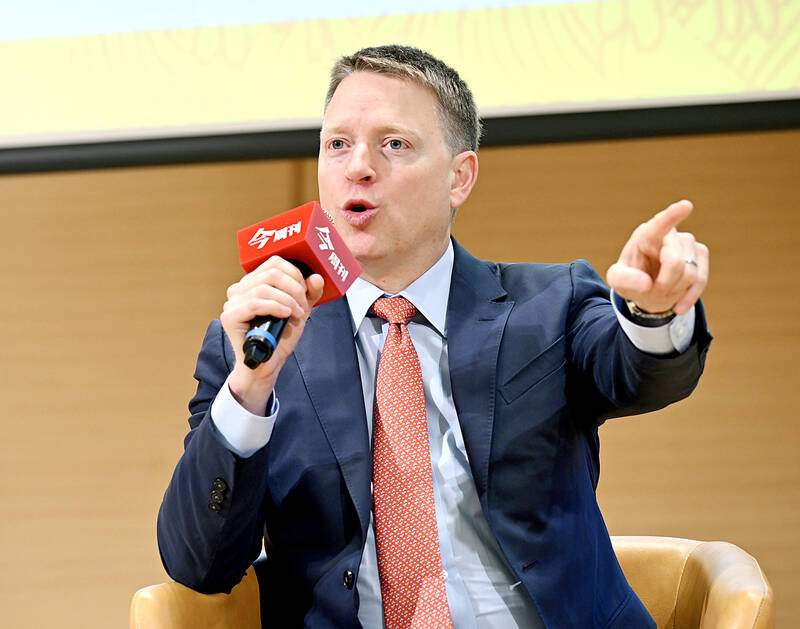Pledges by President William Lai (賴清德) to increase military spending are an important signal of Taiwan’s commitment to self-defense, former US deputy national security adviser Matt Pottinger said at a Halifax International Security Forum event in Taipei (HFX Taipei) yesterday.
Pottinger, who served from 2019 to 2021 during US President Donald Trump’s first term, was referring to Lai’s pledges to boost defense spending to more than 3 percent of GDP.
Lai made the pledges, along with commitments to double down on defense reforms and enhance civil protections, shortly after Trump, speaking with reporters in Washington, accused Taiwan of taking “our chip business away” while threatening tariffs on foreign semiconductors entering the US.

Photo: Lo Pei-de, Taipei Times
“It’s really important as a signal to the United States and other countries about Taiwan’s commitment to its defense,” said Pottinger, who chairs the China Program at the Washington-based Foundation for Defense of Democracies.
Lai’s plan for a special budget, if successful, would bring Taiwan’s defense expenditure on par with the US’ in terms of share of GDP, Pottinger told HFX Taipei.
Three percent “seems like a good bargain to me,” considering Ukraine’s investment in its fight against Russian troops and the US’ at the peak of the Cold War in the 1980s, he said.
Former US ambassador to South Korea Mark Lippert, former Ukrainian parliamentarian Hanna Hopko and Legislator Fan Yun (范雲) also attended HFX Taipei.
Taiwan’s annual defense spending has hovered between 2 and 2.5 percent of GDP since former president Tsai Ing-wen (蔡英文) of the Democratic Progressive Party (DPP) took office in 2016, but it has yet to surpass 3 percent.
It remains to be seen whether Lai’s pledges — which would likely result in Taiwan purchasing more defense articles from the US — will materialize because his party, the DPP, does not have a majority in the legislature and faces a strong backlash from the opposition.
For fiscal 2025, the Cabinet initially earmarked NT$647 billion (US$19.76 billion) for the Ministry of National Defense, or 2.45 percent of GDP.
However, the final appropriation is still uncertain after opposition lawmakers imposed several cuts and freezes during the budget review, some of which might overlap, leaving the executive branch to verify the final figures.

The manufacture of the remaining 28 M1A2T Abrams tanks Taiwan purchased from the US has recently been completed, and they are expected to be delivered within the next one to two months, a source said yesterday. The Ministry of National Defense is arranging cargo ships to transport the tanks to Taiwan as soon as possible, said the source, who is familiar with the matter. The estimated arrival time ranges from late this month to early next month, the source said. The 28 Abrams tanks make up the third and final batch of a total of 108 tanks, valued at about NT$40.5 billion

Two Taiwanese prosecutors were questioned by Chinese security personnel at their hotel during a trip to China’s Henan Province this month, the Mainland Affairs Council (MAC) said yesterday. The officers had personal information on the prosecutors, including “when they were assigned to their posts, their work locations and job titles,” MAC Deputy Minister and spokesman Liang Wen-chieh (梁文傑) said. On top of asking about their agencies and positions, the officers also questioned the prosecutors about the Cross-Strait Joint Crime-Fighting and Judicial Mutual Assistance Agreement, a pact that serves as the framework for Taiwan-China cooperation on combating crime and providing judicial assistance, Liang

A group from the Taiwanese Designers in Australia association yesterday represented Taiwan at the Midsumma Pride March in Melbourne. The march, held in the St. Kilda suburb, is the city’s largest LGBTQIA+ parade and the flagship event of the annual Midsumma Festival. It attracted more than 45,000 spectators who supported the 400 groups and 10,000 marchers that participated this year, the association said. Taiwanese Designers said they organized a team to march for Taiwan this year, joining politicians, government agencies, professionals and community organizations in showing support for LGBTQIA+ people and diverse communities. As the first country in Asia to legalize same-sex

MOTIVES QUESTIONED The PLA considers Xi’s policies toward Taiwan to be driven by personal considerations rather than military assessment, the Epoch Times reports Chinese President Xi Jinping’s (習近平) latest purge of the Chinese People’s Liberation Army (PLA) leadership might have been prompted by the military’s opposition to plans of invading Taiwan, the Epoch Times said. The Chinese military opposes waging war against Taiwan by a large consensus, putting it at odds with Xi’s vision, the Falun Gong-affiliated daily said in a report on Thursday, citing anonymous sources with insight into the PLA’s inner workings. The opposition is not the opinion of a few generals, but a widely shared view among the PLA cadre, the Epoch Times cited them as saying. “Chinese forces know full well that